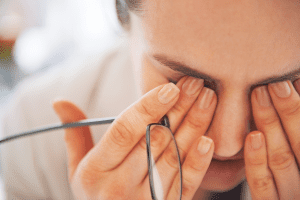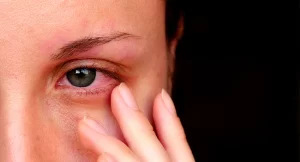Understanding Eyelid Twitching
Eyelid twitching, medically referred to as myokymia, is a common and generally harmless condition that affects many individuals at some point in their lives. This involuntary spasm of the eyelid muscles can occur spontaneously and may last for a few seconds to several minutes. While occasional eyelid twitching is typically benign, persistent or frequent twitching may indicate an underlying health issue or lifestyle factor that warrants attention. Explore More About (Knees Arthritis Shots)
Causes of Eyelid Twitching
1. Stress and Fatigue
One of the most common triggers for eyelid twitching is stress and fatigue. Prolonged periods of stress, anxiety, or insufficient sleep can lead to muscle tension and irritability, including the muscles surrounding the eyes. Managing stress through relaxation techniques, adequate rest, and regular breaks during screen time can help alleviate twitching episodes.
2. Eye Strain
Extended use of digital devices, reading for prolonged periods, or focusing intensely on a task without breaks can strain the eyes, leading to eyelid twitching. Implementing the 20-20-20 rule, which involves taking a 20-second break every 20 minutes to look at something 20 feet away, can reduce eye strain and minimize twitching.

3. Caffeine and Alcohol Consumption
Excessive consumption of caffeine or alcohol can disrupt the body’s natural balance and contribute to muscle spasms, including eyelid twitching. Moderating intake of caffeinated beverages and alcoholic drinks may help reduce the frequency of twitching episodes.
4. Nutritional Deficiencies
Inadequate intake of certain nutrients, such as magnesium or potassium, can affect muscle function and contribute to eyelid twitching. Ensuring a balanced diet rich in fruits, vegetables, lean proteins, and whole grains can help address nutritional deficiencies and support overall health, potentially reducing the occurrence of twitching.
5. Dry Eyes
Individuals with dry eyes may experience eyelid twitching as a result of irritation and discomfort. Maintaining proper eye hygiene, using lubricating eye drops as recommended by a healthcare professional, and staying hydrated can help alleviate dryness and minimize twitching.
6. Allergies
Allergic reactions affecting the eyes, such as hay fever or allergic conjunctivitis, can cause itching, redness, and eyelid twitching. Identifying and avoiding allergens, along with appropriate use of antihistamines or allergy medications, can help manage symptoms and reduce twitching.
7. Eye Irritants
Exposure to environmental irritants, such as smoke, dust, or pollutants, can irritate the eyes and trigger twitching. Minimizing exposure to these irritants, using protective eyewear when necessary, and maintaining good indoor air quality can help prevent irritation and alleviate twitching.

Remedies for Eyelid Twitching
1. Get Adequate Sleep
Prioritize quality sleep by establishing a regular sleep schedule, creating a conducive sleep environment, and practicing relaxation techniques before bedtime to promote restful sleep and reduce twitching.
2. Manage Stress
Incorporate stress-reducing activities into your daily routine, such as meditation, deep breathing exercises, yoga, or hobbies that promote relaxation, to minimize stress-related twitching.
3. Limit Caffeine and Alcohol
Moderate your consumption of caffeinated beverages and alcoholic drinks, especially in the hours leading up to bedtime, to prevent disruptions in sleep patterns and reduce the likelihood of twitching.
4. Practice Eye Care Habits
Follow good eye hygiene practices, such as avoiding rubbing your eyes, taking regular breaks during screen time, maintaining proper lighting conditions, and using lubricating eye drops as needed to keep your eyes healthy and hydrated.
5. Address Nutritional Deficiencies
Eat a balanced diet rich in essential nutrients, including magnesium, potassium, vitamins B and D, and omega-3 fatty acids, to support overall eye health and minimize the risk of nutritional deficiencies that can contribute to twitching.
6. Stay Hydrated
Drink an adequate amount of water throughout the day to prevent dehydration and maintain optimal moisture levels in your eyes, reducing the likelihood of dryness and irritation that can lead to twitching.

7. Consult a Healthcare Professional
If eyelid twitching persists or becomes bothersome despite implementing self-care measures, consult a healthcare professional for a comprehensive evaluation and appropriate management strategies. In some cases, underlying medical conditions or medications may be contributing to twitching, requiring further assessment and treatment.
Comparative Table of Remedies
| Remedies | Description |
|---|---|
| Adequate Sleep | Prioritize quality sleep to promote restful sleep and reduce twitching. |
| Stress Management | Incorporate stress-reducing activities into your daily routine to minimize twitching. |
| Limit Caffeine & Alcohol | Moderate consumption of caffeinated beverages and alcoholic drinks to reduce twitching. |
| Eye Care Habits | Follow good eye hygiene practices to keep your eyes healthy and hydrated. |
| Nutritional Deficiencies | Eat a balanced diet rich in essential nutrients to support overall eye health. |
| Stay Hydrated | Drink an adequate amount of water to maintain optimal moisture levels in your eyes. |
| Consult Healthcare Professional | Seek guidance from a healthcare professional if twitching persists despite self-care measures. |
Conclusion
Eyelid twitching, while often benign, can be a source of discomfort and annoyance for many individuals. By understanding the potential causes and implementing effective remedies, such as managing stress, prioritizing sleep, practicing good eye care habits, and addressing nutritional deficiencies, it is possible to reduce the frequency and severity of twitching episodes. However, if twitching persists or worsens over time, seeking guidance from a healthcare professional is advisable to rule out any underlying medical concerns and receive appropriate treatment. With proactive self-care and professional support, individuals can effectively manage eyelid twitching and maintain optimal eye health and comfort.












